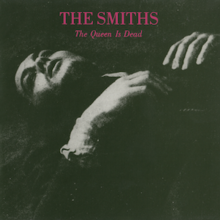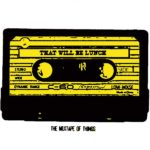Thirty years since its release this week, we look back at The Smith’s classic album ‘The Queen is Dead’.
Without doubt the most complete album in The Smiths‘ canon, emerging off the back of the musically eclectic and personal/political lyrics of Meat Is Murder, its follow-up The Queen Is Dead saw the Manchester outfit reach a creative pinnacle. It was a height that they never quite touched again as the band disintegrated during the making of their patchy last record Strangeways Here We Come.
Released in 1986, The Queen Is Dead is a vivid document of why The Smiths are etched on the heart of every miserable teenager, and everyone looking for memorable, timeless music that retained its independent spirit even as it gate-crashed Top of the Pops. A band that took a step out of the pop comfort zone and tackled subjects in a strikingly emotive yet intelligent way, and in the process influenced countless acts since. A quick scan of the independent scene and one can hear the traces of Morrissey, Marr & Co in everyone from the Arctic Monkeys, Belle and Sebastian to Wild Beasts and way beyond…
Musically there’s not a note out of place here: Johnny Marr’s pristine 60s jangle is matched by the rhythm section of bassist Andy Rourke and drummer Mike Joyce, whose dexterous basslines and insistent solid thuds lay the most marvellous of foundations. Whilst Stephen Patrick Morrissey delivers perhaps his boldest set of vocals to date. No longer fey or shy, his tone consumed by a yearning and underlying sexual tension and defiance that still present melancholia is now dripping in irony, pathos and spite. From the utter absurdity of opener ‘The Queen is Dead’ with its very British type of ridiculous rebellion (“So, I broke into the palace/With a sponge and a rusty spanner/She said: “Eh, I know you, and you cannot sing”/I said: “That’s nothing – you should hear me play piano”), to the sarcastic label baiting of ‘Frankly Mr Shankly’ and ‘Vicar in a Tutu’ there’s a thread of bitter humour that’s oft overlooked in the Smiths’ work.
The stupendous, ridiculously catchy, knowing call and responses of lead single ‘Big Mouth Strikes Again’ is countered by the achingly sad ‘I Know It’s Over’ that details the death of love. There follows the literary metaphors of the prosaic rockabilly of ‘Cemetery Gates’ and the shimmying grace of ‘The Boy With The Thorn In His Side’, one of the greatest expressions of hiding forbidden love ‘under a bushel’ that has ever been executed in pop music. The record climaxes with the unspeakably tragic/romantic imagery of ‘There Is A Light That Will Never Go Out’, its arcing melody balanced gracefully upon a bed of twisting rhythms and elegant strings that drive you off home across Manchester’s darkened streets, and so to bed. It is simply one of the greatest songs ever committed to tape. The Queen Is Dead is that rare thing, an album without a bad moment. It is a snapshot of a time when a startlingly original voice and sharp musical force were in complete synergy: it has only been fully appreciated with the passing of time.
The Queen Is Dead was released on 16th June 1986 through Rough Trade records and reached number 2 in the UK album chart.




